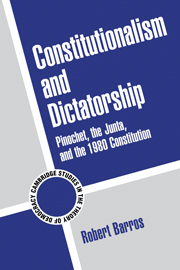Book contents
- Frontmatter
- Contents
- Foreword
- Acknowledgments
- Abbreviations
- Introduction
- 1 Dictatorship, Legality, and Institutional Constraints
- 2 The Constitution of the Exception: Defining the Rules of Military Rule
- 3 The Constitution and the Dictatorship: The Supreme Court and the Constitutionality of Decree-Laws
- 4 The Shadowy Boundary between Force and Law: The Judiciary, Repression, and the Cosmetic Limitation of Emergency Powers
- 5 Constitutionalization without Transition: Prompting the Dual Constitution of 1980
- 6 The Permanent Text: Constitutional Controls or Military Tutelage?
- 7 Even Custom Shoes Bind: Military Rule under the Constitution, 1981–1988
- 8 Military Dictatorship and Constitutionalism in Chile
- References
- Index
7 - Even Custom Shoes Bind: Military Rule under the Constitution, 1981–1988
Published online by Cambridge University Press: 10 December 2009
- Frontmatter
- Contents
- Foreword
- Acknowledgments
- Abbreviations
- Introduction
- 1 Dictatorship, Legality, and Institutional Constraints
- 2 The Constitution of the Exception: Defining the Rules of Military Rule
- 3 The Constitution and the Dictatorship: The Supreme Court and the Constitutionality of Decree-Laws
- 4 The Shadowy Boundary between Force and Law: The Judiciary, Repression, and the Cosmetic Limitation of Emergency Powers
- 5 Constitutionalization without Transition: Prompting the Dual Constitution of 1980
- 6 The Permanent Text: Constitutional Controls or Military Tutelage?
- 7 Even Custom Shoes Bind: Military Rule under the Constitution, 1981–1988
- 8 Military Dictatorship and Constitutionalism in Chile
- References
- Index
Summary
On March 11, 1981, amidst great pomp and ceremony, the constitution went into force. In a private act, Pinochet's closest collaborators first bestowed the tricolor presidential sash upon him. Afterward, the swearing-in ceremony took place in the main hall of the Diego Portales building, the seat of the government and Junta offices. Accompanied by the rest of the Junta, the cabinet, the members of the Constitutional Tribunal, and the Justices of the Supreme Court, General Pinochet took the oath of office and swore allegiance to the constitution and the law. Later, in the Metropolitan Cathedral, Cardinal Raúl Silva Henríquez celebrated the traditional Te Deum Mass. The following morning, President Pinochet became the twenty-eighth president to occupy the majestic La Moneda palace, whose reconstruction after the September 11, 1973 bombing had just been hastily completed. That night a reception was held in the Patio de los Naranjos of the palace. The constitutionalization of military rule was being embellished with all of the traditional Republican pageantry of the past.
Beyond the immediate circle of those in power and pinochetista civilians, there was little to celebrate on March 11, 1981. The armed forces had been in power for seven and a half years and their new constitution did nothing to change that. For all the talk of the “constitution of liberty,” Chile remained subject to military rule. In the eyes of the opposition and foreign critics, the constitution was merely a move to legitimate further dictatorship. Like most authoritarian constitutions, the elaborate democratic edifice of the 1980 constitution, even with its many restrictive precepts, was nothing more than a façade: Through the back door authoritarian rule reappeared and was firmly entrenched.
- Type
- Chapter
- Information
- Constitutionalism and DictatorshipPinochet, the Junta, and the 1980 Constitution, pp. 255 - 307Publisher: Cambridge University PressPrint publication year: 2002



